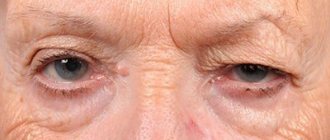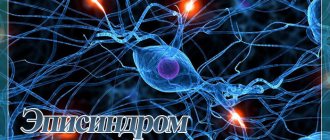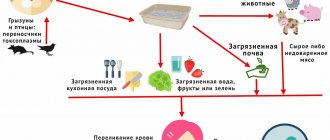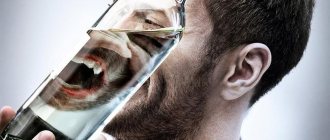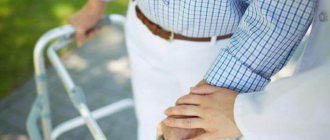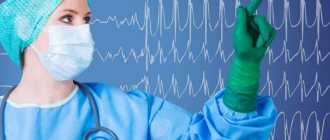Home>Articles>Alcoholic epilepsy
quick menu (hide)
- Reasons for appearance
- How does an attack go?
- Consequences and risks
- How is the treatment carried out?
- Treatment of alcoholism as a solution to the problem
Alcoholic epilepsy is a type of psychosis caused by prolonged consumption of alcohol in large doses. It usually appears at the 3rd stage of addiction. In the presence of external catalytic factors, it may appear earlier. At the initial stages, it does not have a pronounced form of seizures with tremor and paralysis, but rather manifests itself in irritability, absent-mindedness and other sudden changes in behavior. Without taking measures, it further develops to a state of pronounced epileptic seizures.
An alcoholic epilepsy attack occurs suddenly, so the disease is primarily dangerous for the person who drinks. However, manifestations of aggression and anger in the later stages are dangerous for others, since during a seizure, a person does not control his own behavior.
Reasons for appearance
The causes of alcoholic epilepsy, like most other pathologies in alcoholics, come down to organ disorders caused by the influence of alcohol. In this case, we are talking about damage to the brain. The fact is that long-term consumption of alcohol, especially with periodic heavy binges, leads to the accumulation of toxic substances and breakdown products of ethyl alcohol in the body. They affect all organs and lead to problems in the blood supply to the brain, which in turn causes irreversible and destructive consequences.
The problem is cumulative in nature, invisible in the initial stages, and becomes more and more noticeable after the 2nd stage of alcoholism. Therefore, most often, the disease manifests itself in alcoholics with a long history of addiction. However, in some cases, alcoholic epilepsy develops faster due to additional factors damage , for example, due to trauma, severe viral infections.
Occurrence of the disease
This state of affairs, in which a heavy alcoholic has his first seizure , is today called “alcohol withdrawal seizures,” although previously it was not entirely correctly called “alcoholic epilepsy.” The disease itself is similar to the disease of a teetotaler; the differences lie only in the situations that provoke the attacks. It is highly likely that drinking alcohol by a person with epilepsy who is not drinking will cause him to have a seizure.
According to various information, epileptic seizures are recorded after drinking alcohol in patients, which accounts for up to a quarter of cases of the total number. Effective treatment of the disease involves complete abstinence from alcohol, since alcoholism is a strong inhibitory factor in the recovery process. Medical practice knows a large number of cases of death from seizures. In this case, the first manifestation of the disease in chronic alcoholism is status epilepticus.
Alcoholic epilepsy is characterized by the following risk factors:
- Failure to correctly follow medical instructions;
- Refusal to take medications, ineffective use of medications with alcohol;
- Significant changes in the metabolism of drugs, ineffectiveness of treatment with medications;
- and etc.
Significantly enhancing the sedative effect of certain drugs for epilepsy, alcohol reduces their level of effectiveness in treating the disease. Therefore, the patient either begins to take medications in the required doses, or abuses them, which leads to minimal effect or even creates a danger to the health of the patient.
Important: Consider the lack of data on the relationship between smoking and epilepsy, which is different from alcoholism. Despite the large number of people who smoke and suffer from the disease, there is no accurate knowledge of such interactions. But in this regard, the harm from smoking does not decrease for a person suffering from epilepsy compared to a healthy person.
As a result of the interaction between antiepileptic drugs and alcoholic beverages, the following occurs:
- Increased sedative effect;
- Decrease in the level of effectiveness of treatment due to a decrease in the concentration of drugs in the blood;
- Certain medications enhance the effects of alcohol intoxication, and their results can be extremely disastrous;
- According to statistics, drinking up to about six units of alcohol weekly does not increase the level of epileptic seizures in most patients. According to researchers of this issue, the dosage of alcohol in any form can lead to a negative effect, but there is no basis for an irrevocable ban on alcohol consumption.
If there is evidence that alcohol provokes epilepsy, it is necessary to completely stop drinking alcohol. We can talk about a 100% guarantee of effect for people dependent on alcohol who regularly exceed the permissible dose many times over.
Important: Taking antiepileptic drugs along with drinking alcohol often results in seizures. These types of attacks can be fatal, especially in cases where first aid is not available.
Alcoholic epilepsy can be identified by the following symptoms:
- There is a feeling of discomfort, convulsive contractions;
- Convulsions, trembling, joints and muscle mass become twisted;
- The person suffers from hallucinations that are very difficult to bear;
- The ability to speak and coordinate one's own movements is lost.
As a rule, the duration of these symptoms is a couple of minutes, after which the person simply forgets about everything that happened to him. An epileptic attack can be triggered by certain sounds, flashes of light, or head injuries.
How does an attack go?
Alcoholic epilepsy, the causes of which lie in disruption of the brain and other organs due to poisoning with the breakdown products of ethyl alcohol, is similar to standard epilepsy. The main and most striking difference is the disturbance of consciousness in alcoholics immediately before and after an attack. The disorder manifests itself in different ways. The patient may be in an unnaturally elevated or, on the contrary, depressed state, and exhibit excessive activity. In some cases, the appearance of auditory and sound hallucinations is observed.
Before, as well as during the seizure itself, a person behaves as follows:
- An attack can start with muscle pain, a compressive or acute headache;
- Due to contraction of the vocal cords, the patient experiences loud, uncontrollable screams;
- Uncontrolled urination occurs;
- Control of consciousness disappears, manifesting itself in different ways, from hallucinations to hysterics and aggression;
- A seizure is accompanied by muscle contractions resembling convulsions, tension in the limbs and other muscles of the body;
- The pulse increases noticeably - up to 170 beats per minute, while breathing, on the contrary, slows down due to tension in the lungs. The respiratory rate periodically decreases to 8 exhalations per minute;
- There is arching of the body due to muscle contraction; depending on the area of brain damage, the attack is accompanied by distortion of facial features or spasms of the limbs, or a combination of all symptoms in the most severe cases.
Recovery from an attack occurs quite suddenly. However, after suffering stress, the patient continues to feel pain in the limbs and other muscles, causing temporary paralysis. The pain continues for some time, after which the condition gradually clears up.
Alcoholic epilepsy, the consequences of which can be sad, is one of the manifestations of psychoses caused by alcoholism. Seizures rarely occur during heavy drinking. As a rule, they occur on the second or third day after, especially with a sharp exit from binge drinking. In some cases, there may be precursors of an attack, manifested in the form of headaches, dry mouth and other manifestations of malaise caused by poisoning.
Consequences and risks
The consequences of seizures are the most dire, especially if the alcoholic is often left alone. Convulsions are accompanied by loss of coordination and loss of consciousness. In this condition, the patient is capable of injuring himself by falling or further in spasmodic attack. In addition, severe pain and disturbances in the functioning of the heart can provoke many negative consequences, causing a stroke or other problems.
If you do not take action and do not treat both epilepsy itself and alcoholism, which creates a negative background for many other problems, the situation will end in death or irreversible brain damage. If you notice the first symptoms of a seizure or a tendency to have one, you should immediately seek help from specialists.
First aid
Timely first aid will help save a person’s life or reduce the risks of developing a stroke or cerebral edema. Stopping an epileptic attack by any influence or manipulation is an impossible task. You can only wait until the symptoms go away on their own, while protecting the victim from injury. There is no point in holding back convulsive twitches.
The first thing to do is to remain calm, because in a state of panic it is impossible to provide help. It is important to follow the following recommendations:
- do not allow the victim to bite his tongue (in this case, saliva enters the respiratory tract) - to do this, turn his head to the side;
- ensure that the victim is not injured during a fall and loss of consciousness;
- protect the patient’s head from impacts, place it on a pillow or blanket;
- unfasten the buttons of the patient’s clothing, remove obstructive objects (belts, scarves, etc.);
- To avoid choking on vomit, turn your head to the side;
- call emergency medical assistance.
Clear and quick actions to provide assistance are an important point; you cannot hesitate in this situation. After the attack, the victim feels severe weakness and disorientation. It is necessary to organize a vacation, after which you must visit a narcologist.
How is the treatment carried out?
Alcoholic epilepsy, the symptoms of which are a reaction to damage and malfunction of the brain, is a consequence of alcoholism. The occurrence of this type of psychosis is a sign that the body is working to the limit and in the near future, under the same loads, the saddest outcome will come if you do not radically change your life.
Treatment of epilepsy takes place in a hospital or at home, after calling a narcologist. Drug therapy is used for treatment In particular, the following types of drugs are used:
- Antispasmodic drugs;
- Drugs for restoring memory and brain activity;
- Sedatives and tranquilizers;
- Products for detoxification of the body;
- Vitamin cocktails to restore strength after a seizure.
Drugs are selected strictly on an individual basis, treatment occurs a course , with additional medications taken during an attack or when warning signs appear. The dosage and time of administration are also prescribed by the doctor; experimenting with them on your own is not recommended.
In combination with therapy prescribed by a specialist, it is allowed to use traditional medicine techniques, drink infusions and decoctions of herbs to calm and cleanse the body. Maintain rest and bed rest until full recovery.
Treatment of alcoholism as a solution to the problem
Alcoholic epilepsy, the treatment and relief of which can be carried out relatively successfully both in the hospital and at home, is only a symptom of the underlying disease. The main cause of such diseases is alcohol addiction . To prevent attacks of epilepsy and other forms of psychosis from recurring again and again, you need to completely stop drinking or reduce alcohol consumption to a safe minimum.
To treat alcoholism, you need to seek professional help from a narcologist. The procedure includes both the medication part of the therapy and work with a psychologist, and often with a psychiatrist. The manifestation of epilepsy, delirium tremens and other psychoses is an extreme symptom of addiction, in which a person needs to be saved in the literal sense. To get started, you need to contact specialists who will provide assistance.
Helpful information
Find out:
- What does a breakdown after coding for alcoholism lead to?
- What will a pregnant woman’s alcoholism mean for her unborn child and is it possible to restore the health of a baby with intrauterine alcohol syndrome .
- How to identify alcohol addiction and the most common reasons why it occurs.
- What are the consequences of drug abuse, what are the dangers of drug addiction, where to get urgent drug treatment at home and in a clinic.


